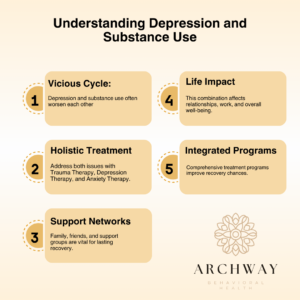The interaction between depression and substance not only complicates treatment but can also lead to severe consequences for mental and physical health. In this blog post, we will explore how depression and substance use are linked, the impact of this combination, and the importance of comprehensive mental health treatment approaches like trauma therapy, depression therapy, and mental health treatment Programs.
The Combination Of Depression and Substance Use
Depression and substance use frequently coexist, often exacerbating each other. Unfortunately, substance use can worsen symptoms of depression and lead to a vicious cycle where the substance provides short-term relief but deepens the underlying issues.
The chemical imbalances caused by drug or alcohol use can alter mood and decrease overall mental well-being. This interplay creates a complex situation where treating one condition without addressing the other often leads to suboptimal outcomes.
The Impact of Co-Occurring Disorders
The combination of depression and substance use can have profound effects on various aspects of life. Relationships often suffer, as the individual may withdraw from social interactions or engage in behavior that strains personal connections. Employment and academic performance can also decline due to the difficulties in maintaining focus, motivation, and energy levels.
Why Do You Need Comprehensive Mental Health Treatment?
Addressing depression and substance use requires a holistic approach that considers both conditions simultaneously.
Past trauma often contributes to both depression and substance abuse, making it essential to address these underlying issues. Trauma Therapy aims to help individuals process and heal from past traumatic experiences, which can, in turn, reduce symptoms of depression and lessen the reliance on substances as a coping mechanism.
-
Depression Therapy
Depression therapy focuses on alleviating the symptoms of depression through various therapeutic modalities. CBT, for instance, helps people challenge negative thought patterns that contribute to their depressive symptoms. Effective depression therapy can make a significant difference in an individual’s overall well-being and reduce the likelihood of turning to substances for relief.
-
Anxiety Therapy
Anxiety often accompanies depression and can further complicate substance use. Anxiety therapy addresses the underlying causes of anxiety and provides tools to manage symptoms effectively. Techniques such as mindfulness, relaxation exercises, and exposure therapy can help individuals gain control over their anxiety and reduce the temptation to use substances as a means of escape.
-
Mental Health Treatment Programs
Mental health treatment programs are crucial for individuals dealing with substance abuse. These programs offer structured resources to help individuals overcome their dependence on drugs or alcohol. Integrated treatment programs that address both substance abuse and co-occurring mental health issues provide a comprehensive approach, improving the chances of long-term recovery.
The Role of Support Networks and Relapse Prevention
Family, friends, and support groups can offer encouragement, accountability, and understanding. Engaging with a supportive community helps individuals stay committed to their treatment plan and navigate the challenges of recovery. Developing strategies to handle triggers, stressors, and cravings helps maintain their progress and prevent a return to substance use.
Moving Forward: Hope and Healing
The combination of depression and substance use is undeniably challenging, but with the right approach, recovery is possible. Comprehensive mental health treatment that includes Trauma Therapy, Depression Therapy, Anxiety Therapy, and Mental Health Treatment Programs offers a path to healing and a chance for a healthier, more fulfilling life.
Through dedicated treatment, support, and personal commitment, it is possible to overcome these challenges and achieve lasting recovery. If you or someone you know is struggling with depression and substance use, seeking professional help is the first step towards healing.
Depression and substance use often fuel each other, creating a vicious cycle that can be difficult to escape. Using drugs or alcohol to cope with feelings of sadness or hopelessness only deepens the emotional and physical toll, making recovery seem impossible. However, with the right treatment, breaking free is achievable. Our specialized programs target both depression and substance use, offering a path to healing and long-term recovery. Don’t let this dangerous combination control your life. Reach out today at (888) 488-4103 to begin your journey toward wellness.
FAQs: Depression and Substance Use
What is the relationship between depression and substance use?
Depression and substance use often coexist, with one condition worsening the other.
Can depression lead to substance abuse?
Yes, individuals with depression may turn to substances as a way to self-medicate and cope with symptoms.
Can substance abuse cause depression?
Yes, substance abuse can directly contribute to the development of depression or worsen existing symptoms.
What are the effects of combining depression and substance use?
This combination can lead to increased risk of suicide, overdose, and other health problems.
How does depression affect mental health recovery?
Untreated depression can hinder recovery efforts and increase the likelihood of relapse.
How does substance abuse affect depression treatment?
Substance abuse can interfere with the effectiveness of antidepressant medications and therapy.



